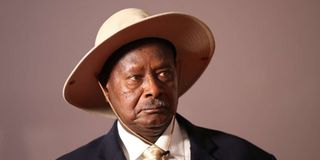Why Museveni may not sign contentious Sexual Offences Act

Ugandan President Yoweri Museveni.
What you need to know:
- Parliament is yet to push the Act forward for his assent.
- By criminalising homosexuality, already a crime in the Penal Code Act, MPs of the lapsing 10th Parliament have returned Uganda to the 2014 situation in which the country wrestled donor attacks when President Museveni signed the Anti-Homosexuality Act into law.
Kampala. President Yoweri Museveni has reportedly said he will not sign the newly-enacted Sexual Offences Act, 2019, into law, citing potential foreign policy implications, according to highly-placed sources.
The president’s thoughts, which come to light even before Parliament pushes the Act forward for his assent, follows high level discussions last week.
Senior Ugandan diplomats involved in the process reportedly informed Mr Museveni that the proposed law, which, among other things, criminalises homosexuality afresh and sets 10-year jail term for offenders, was uncalled for.
“There is no local by-in of the law [Parliament did not consult the population], the President was not aware and there is no political dividend after he was re-elected [in January], making the new law an unnecessary burden for him,” a source said.
The shuttle diplomacy coordinated by one of Uganda’s envoys to the United States reportedly followed inquiries by Washington about the renewed criminalisation of homosexuality, which US President Joe Biden’s administration has highlighted among foreign policy priorities.
The Ugandan envoy then conferred with Mr Museveni, who reportedly told the diplomat to inform the American administration that he will not sign the legislation into law, prompting the US to ease pressure and withhold a statement it was due to issue on the Bill.
Ms Lindah Nabusayi, the senior presidential press secretary, on Sunday said: “I can’t confirm this development now, but let me cross-check for you.”
The move also comes days after the United Nations Office of the High Commissioner for Human Rights (UNHCR) called on Uganda to amend a Bill as it would violate human rights and undermine public health.
By criminalising homosexuality, already a crime in the Penal Code Act, MPs of the lapsing 10th Parliament have returned Uganda to the 2014 situation in which the country wrestled donor attacks when President Museveni signed the Anti-Homosexuality Act into law.
The Constitutional Court struck down the law weeks later on a technicality, saying it was passed without quorum.
When President Museveni returned from an August 2014 visit to Washington DC for the US-Africa summit, he told Ugandan lawmakers to “go slow” because the legislation had “foreign policy implications”.
The initial Sexual Offences Bill, 2019, sponsored by the Uganda Women Parliamentary Association (UWOPA), only imported offences of unnatural sex as provided in the Penal Code Act, but MPs while enacting the Bill on May 3, introduced explicit language in Clause 11 that banned anal sex and sex between persons of the same gender.
Kumi District Woman MP Monica Amoding, who moved the original Bill in her capacity as UWOPA chairperson, told The Monitor that the legislated version contained gains and misses in amendments adopted in the “wisdom of the House (Parliament)”.
The new Act, among others, also criminalises and sets stiff penalties for sexual assault, indecent assault, cat-calling, indecent communication, sexual harassment, exploitation of detainees, sexual exploitation, unnatural offences, simple defilement, aggravated defilement, and incest.
Uganda first criminalised homosexuality and imposed life imprisonment penalty for convicts in 2014 and Mr Museveni, while signing the anti-gay Act of Parliament into law, said Ugandan scientists had convinced him that homosexuality was an act of nurture, not nature.
The law, however, strained Uganda’s relations with donors and opened up the country to condemnation by rights groups before court annulled it.
Report by Anthony Wesaka





